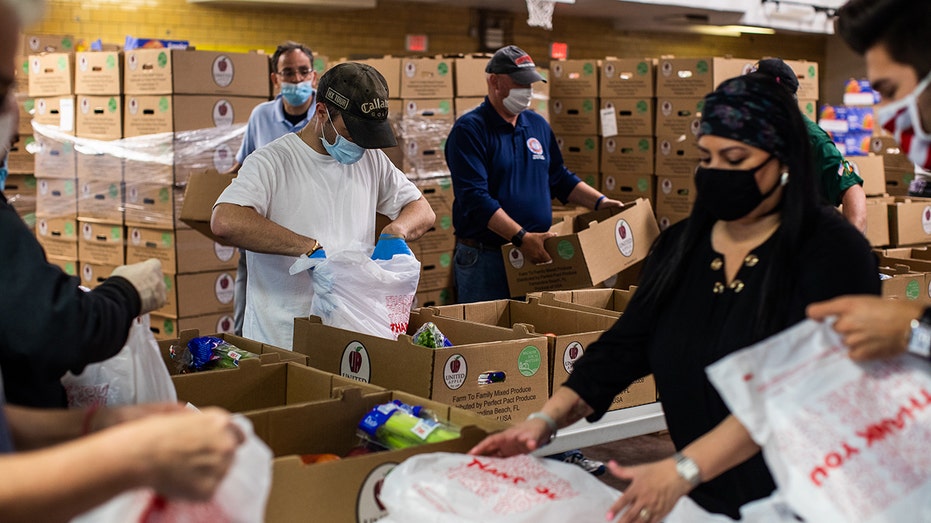Check out what’s clicking on FoxBusiness.com.
Food relief organizations nationwide are warning of the “hungriest summer” in recent memory because of inflation, just weeks after President Biden blamed his predecessor for long pandemic food lines.
High inflation has both placed an increased financial burden on poor families and made it more difficult for food pantries to provide relief to such families, several charities told Fox Business. Higher prices combined with expiring pandemic benefits and fewer donations has led to soaring demand that the groups said is expected to remain high in the near-term.
In May, though, Biden slammed former President Trump for the long lines many Americans were forced to wait in for boxes of food amid the early stages of the COVID-19 pandemic. He said Republicans want to “forget it.”
FOOD BANKS ARE SERVING MORE PEOPLE AGAIN AS INFLATION SQUEEZES BUDGETS
“Remember those long lines you’d see on the television and people lining up in all kinds of vehicles just to get a box of food in their trunk?” Biden remarked during a speech in Chicago. “How quickly we forget people were hurting. And what did the [Make America Great Again] crowd want to do? Forget it. Forget it.”
“God, this is the United States of America,” he said. “The idea that people would have to wait in line an hour or hour and a half to get a box of food in their trunk — it’s just unbelievable.”
The president argued that the American Rescue Plan, the nearly $2 trillion pandemic stimulus package he signed into law shortly after taking office, has helped feed 41 million people. The Trump administration distributed 155 million food boxes to families in need in the beginning of the pandemic and separately allocated more than $2 billion in 2019 and 2020 to its Food Purchase & Distribution Program.
However, groups like Meals on Wheels America, which provides support for more than 5,000 local community programs and affiliates that seek to feed seniors, warned that they may soon be forced to reduce services “if federal funding doesn’t keep pace with demand, inflation and our growing aging population.”
“Meals on Wheels America is seeing a higher demand on the ground and we expect demand to remain high,” Jenny Young, a spokesperson for Meals on Wheels America, told Fox Business in an email. “According to our latest survey of local Meals on Wheels programs, 8 out of 10 are still serving more home-delivered meals and seniors than prior to the pandemic.”
“In fact, millions of older Americans face a looming ‘hunger cliff’ as we’re seeing decreases in philanthropic support and the phasing out of federal emergency funding and flexibilities that have reinforced the hunger safety net during the pandemic,” she said. “This is all compounded by inflation.”
MEAT PRICES SOAR AS INFLATION HITS US SHOPPERS
Overall, the Consumer Price Index surged 9.1% year-over-year in June, the fastest pace of inflation since 1981, according to the Department of Labor. The food prices category alone soared more than 10% with at home meals increasing a whopping 12.2%, the biggest jump since the 1970s.
Executive director of Lay Ministries Kara Brown joined ‘Fox & Friends First’ to discuss the growing demand and how it is impacting supply at the food pantry.
A White House official told FOX Business that inflation remains the president’s top priority and noted that the U.S. unemployment rate has dropped from 10.2% to 3.6% since he took office. The official pointed to programs like a $500 million effort to lower fertilizer costs that the administration has pushed to lower food prices and blamed the high prices on supply chain disruptions and Russia’s invasion of Ukraine.
Still, upcoming nationwide second quarter data is expected to show demand for food donations has recently skyrocketed, according to officials with Feeding America, a national network of more than 200 food banks serving more than 46 million people. Feeding America President Katie Fitzgerald said the issue is likely not “going to get better overnight” in a recent interview with The Associated Press.
US FOOD BANKS SEE LONG LINES, INCREASED DEMAND
“We’re living through the hungriest summer in recent history,” Allison O’Toole, the CEO of the Midwestern food bank and Feeding America member Second Harvest Heartland, told Fox Business. “We’ve got record high gas prices and consumer prices — those prices are outpacing wage increases for people which is putting a ton of pressure on Minnesota families and families in western Wisconsin as well.”
“We’re seeing food shelf visits that are increasing, up even 30% in places,” she continued. “Food banks are seeing rises in prices just like consumers are at the grocery store. We have the same supply chain issues, we buy a lot of food per year. Across the board, our prices are up about 25% over last year for food that we purchase and our donations of food are lagging in a big way.”

Volunteers bag groceries at a Catholic Charities Brooklyn and Queens pop-up food pantry in New York City on May 29, 2020. (Demetrius Freeman/Bloomberg via Getty Images)
Young echoed O’Toole’s comments, saying local Meals on Wheels programs are seeing operational costs hit all-time highs “making it challenging to reach all those in need.” High gasoline prices, for example, can be a deterrent to volunteers, she said.
Society of St. Vincent de Paul CEO Dave Barringer added that inflation in various sectors are having major indirect impacts on food prices and Americans’ ability to budget.
“The three big drivers are rent, energy costs and, specifically, gasoline,” Barringer told Fox Business in an interview. “Those three tend to hurt people who are closer to the margins more than the rest of us because it’s a larger percentage of their income.”
AVERAGE AMERICAN WORKER HAS LOST $3,400 IN ANNUAL WAGES UNDER BIDEN THANKS TO INFLATION
“We’re getting a lot of working poor people coming to us who just can’t make it paycheck-to-paycheck anymore because the cost increase of those goods is higher than any wage increases they’ve seen over the same period,” he said.

Cars are lined up in traffic on Airline Drive after a food distribution site at Reyes Produce opened on April 13, 2020 in Houston, Texas. (Mark Felix//AFP via Getty Images) (Mark Felix/AFP via Getty Images / Getty Images)
Barringer noted that while pandemic demand was high, current demand is higher due to expiring COVID-19 benefits and subsidies. He also said many people thought the government’s rent abatement program meant their rental payments would be completely forgiven, not delayed.
“Now they’re stuck with a huge rent bill and they’re coming to us for more help,” he told Fox Business.
GET FOX BUSINESS ON THE GO BY CLICKING HERE
In addition, O’Toole said Second Harvest Heartland has recently experienced a roughly 55% decline in contributions from The Emergency Food Assistance Program (TEFAP), a federal program that provides emergency food supplies to local food banks and soup kitchens. Along with inflation and expiring pandemic benefits, the TEFAP contribution decreases has created a “perfect storm,” she said.
“We need America’s help,” said Young from Meals on Wheels.
The Associated Press contributed to this report.







